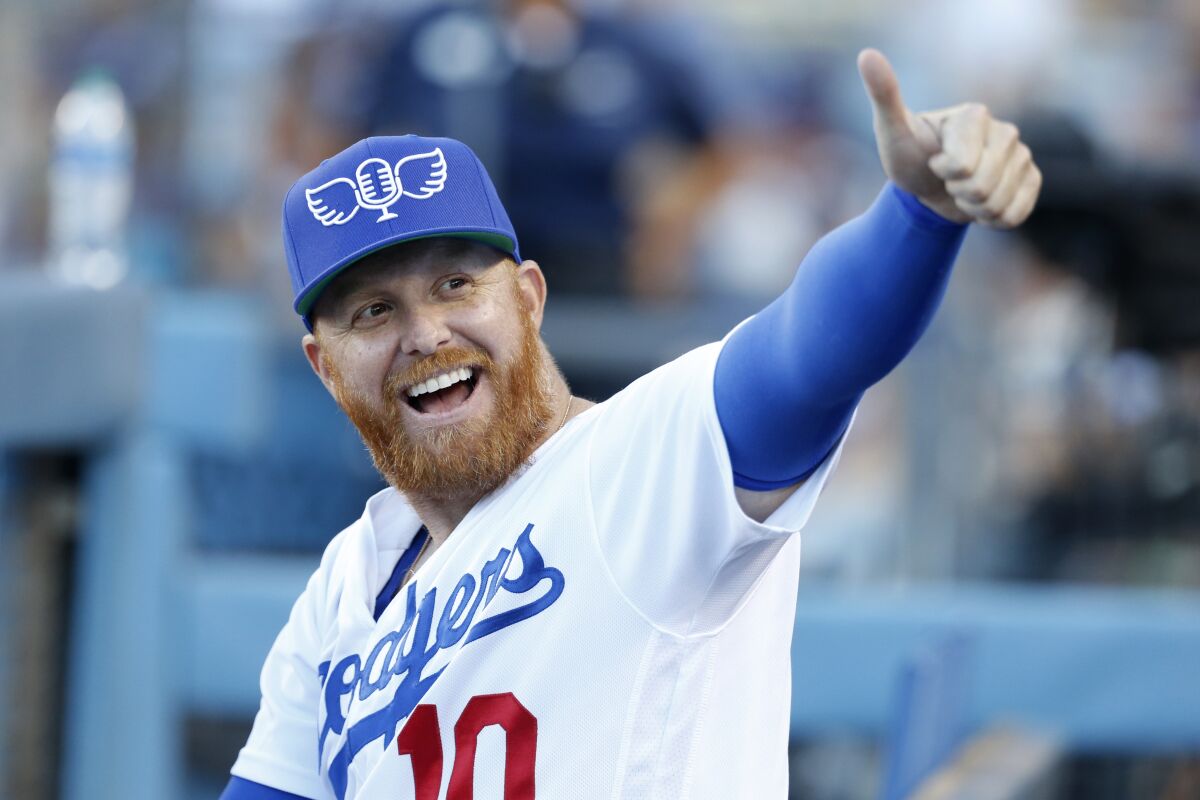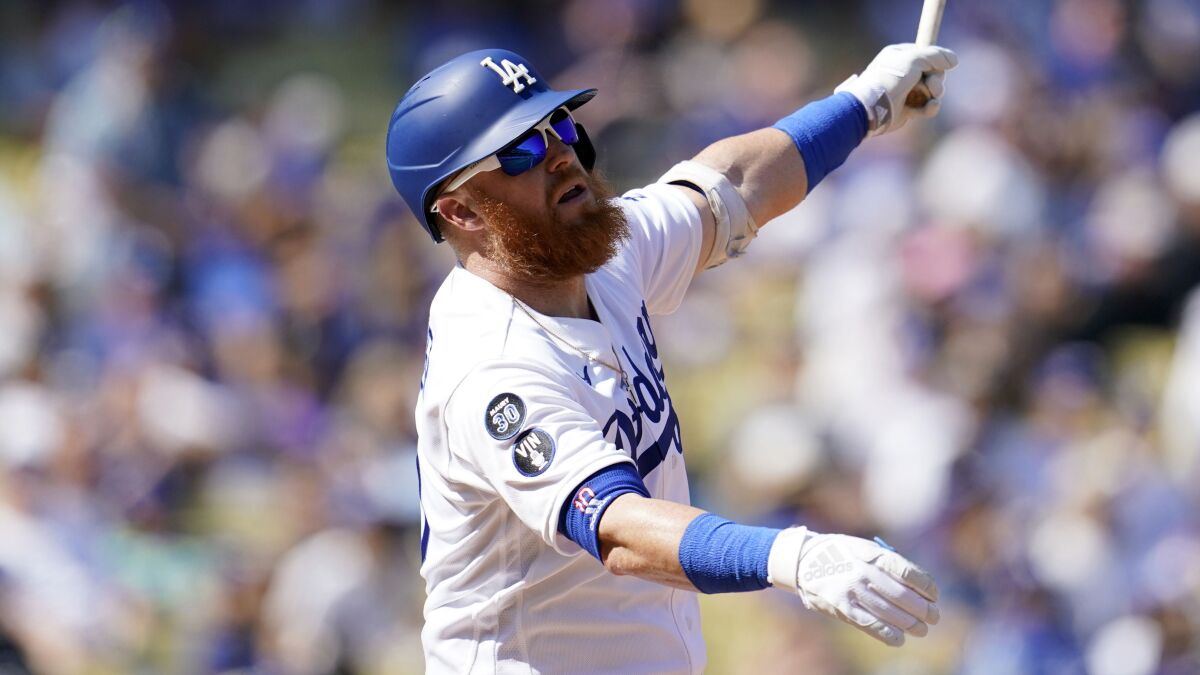Plaschke: Hometown hero Justin Turner wore L.A. on sleeve and carried city in heart
He was never their best player. He was never their biggest star.
He never won a batting title. He never scored a Gold Glove. He never signed a historic contract.
It required a mass organized effort to vote him into his first All-Star Game. When his team recorded the final out of his only championship, he wasn’t even on the field.
Despite being in the middle of the greatest nine-year stretch in franchise history, Justin Turner was never the most famous, celebrated or accomplished of Dodgers.
But he was the Dodger who signed baseballs for military heroes. He was the Dodger who passed out lunches to children. He was the Dodger who smoothed waters in the clubhouse. He was the Dodger who churned up dirt on the field.
He once hit a walk-off playoff home run on the anniversary of Kirk Gibson’s blast. He once saved a title with a diving tag in base line chalk. He would forever saunter to home plate with a pine tar splotch on his back and a playful gleam in his eyes.
Then there was that red hair and shaggy beard, what a glorious sight, as colorful and wild and tangled as the city he represented, perhaps the most famous hirsute display in the history of Southland sports.
Turner wasn’t the best Dodger, but he was the very best of the Dodgers and, my, how Los Angeles will miss him.
Earlier this week, the free agent Turner agreed to a two-year contract with the Boston Red Sox worth about $22 million, ending the Dodgers’ most unlikely powerful community connection.
He arrived here on the scrap heap, cut by the New York Mets after the 2013 season, scooped up by shrewd former general manager Ned Colletti, given a million bucks and a minor league contract.
Nine years later, he had helped lead the Dodgers to eight division championships and three World Series appearances while evolving from benchwarmer to legend with his accessibility, inclusivity and homespun charm.
“An historic Dodger,” Colletti said this week.
The conclusion to that history was both expected and blameless. The Dodgers wanted to keep him and were competitive in their one-year offer, but they were understandably unwilling to go two years for a 38-year-old who had slowed in the field. Turner wanted to finish his career here, but it’s impossible to begrudge him the extra $11 million or so he will make in Boston.
He is gone but will be forever remembered by a fan base that eventually felt so close they stopped calling him by his formal name.
To everyone, the kind and cool third baseman was just “J.T.”
“He was the kind of player fans never forget, not because of how he played but because of who he was,” Colletti said.

Then-Dodgers third baseman Justin Turner wears a cap honoring legendary broadcaster Vin Scully at Dodger Stadium on Aug. 5.
(Gary Coronado / Los Angeles Times)
A Lakewood native and Cal State Fullerton product, J.T. was a neighbor, and he acted like it.
He gave away countless tickets. He posed for countless selfies. On that wondrous night in 2017 when he celebrated the anniversary of Gibson’s feat, he talked about watching Gibson’s homer from his grandfather’s living room.
This was his backyard. He hugged everyone in it. He was one of the emcees of the L.A. Marathon after it began at Chavez Ravine. He was also the sole proprietor of what became one of Chavez Ravine’s most important traditions.
During every home game at Dodger Stadium, after a veteran was honored on the field, J.T. would stop them at the dugout, shake their hand and hand over an autographed baseball. He never publicized it, doing it so quietly it was easy to miss, but every veteran noticed it and several have said it was the best part about being honored.
“I always knew he respected being a Dodger and knew what it was like,” Colletti said. “He took it to heart and the responsibility that comes with it.”
J.T. believed a big part of that responsibility involved leading his younger teammates, and so he did, helping numerous struggling kids become effective contributors, standing up for scolded rookies, calming stressed veterans, serving as a liaison between the players and manager Dave Roberts, manning his back-corner locker as if it were an anchor. He was the Dodgers’ Derek Jeter.
“You know J.T. is such a cornerstone of the franchise and has meant so much to me personally in everything that he does on and off the field,” Clayton Kershaw told MLB Network on Monday, later adding: “You just see him and his mannerisms and demeanor every day, you just go to the ballpark thinking that you’re going to win the game when you see him. That’s the compliment that I can’t give to everybody, so you know we’re going to miss him, I’m going to miss him. It’s going to be so weird to not have him in the clubhouse.”
That leadership extended to the field, where he frequently showed up big in the biggest of moments. In an era when other higher-paid Dodgers frequently failed in October, he recorded an .830 on-base-plus-slugging percentage with 13 home runs and 42 RBIs in 86 postseason games.
“He was the kind of player fans never forget, not because of how he played but because of who he was.”
— Former Dodgers general manager Ned Colletti

Justin Turner hits for the Dodgers during a game against the Colorado Rockies on Oct. 5 at Dodger Stadium.
(Marcio Jose Sanchez / Associated Press)
His three-run, walk-off homer in Game 2 of the 2017 National League Championship Series against the Chicago Cubs helped vault the Dodgers into the World Series while earning him NLCS co-most-valuable-player honors.
Just as compelling, perhaps, was his diving tag of Atlanta’s Dansby Swanson on the third base line in Game 7 of the 2020 NLCS to help push the Dodgers back to the World Series.
It was after that World Series clincher against the Tampa Bay Rays that J.T.’s Dodgers career briefly careened off-track when he returned to the field to celebrate unmasked with his teammates despite being sidelined because of a positive COVID test earlier in the game.
He did a dumb and dangerous thing but later apologized, saying he could not bear to watch the trophy celebration from the trainers’ room because a championship was “the culmination of everything I’ve worked for in my career.”
Fans understood. Fans forgave. His ensuing two seasons here were filled with loud ovations and endless pine tar splotches and so many more autographed baseballs.
His final interview as a Dodger was typical. The team had just been stunned by the San Diego Padres in the National League Division Series in early October, and he was standing in front of his locker with his cap on backward and his beard glowing an angry red.
He was asked by The Times’ Mike DiGiovanna whether this loss was worse than previous postseason failures.
“They all suck,” he said.
That was J.T., speaking like a fan, speaking for the fans, wearing the emotions of Los Angeles on his sleeve, leaving an imprint as enduring as that hair, from the scrap heap to a city’s heart, the Dodgers’ Dodger, the best of the best.
For all the latest Sports News Click Here
For the latest news and updates, follow us on Google News.
